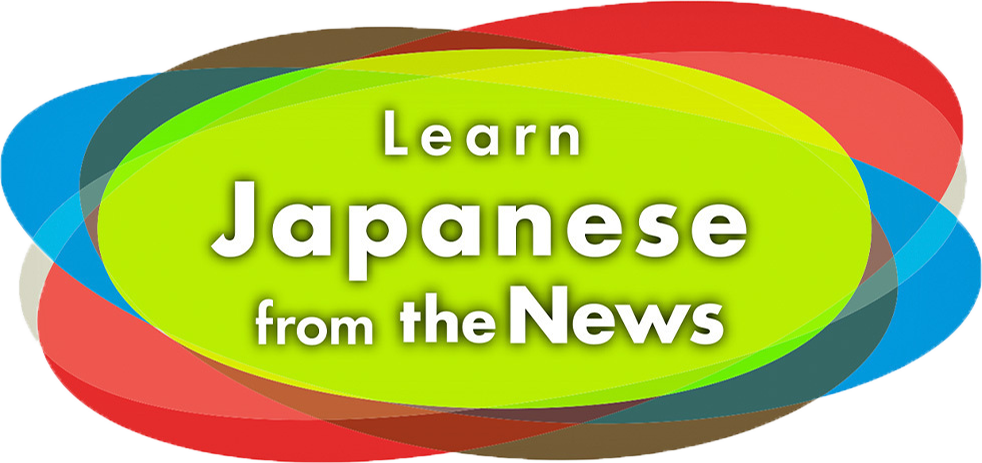
Learn Japanese from the News
Use the news to learn Japanese and take conversations to a new level.
電動キックボードを運転するとき、法律に違反してお酒を飲んで運転する人が増えていて、違反をなくすために貸し出し会社や警察が動き出したというニュースです。このニュースを通して、運転免許や法律違反などに関連したことばや表現を学びましょう。
でんどうきっくぼーどを うんてんするとき ほうりつに いはんして おさけをのんでうんてんする ひとが ふえていて いはんを なくすために かしだしがいしゃや けいさつが うごきだしたという にゅーすです。このにゅーすを とおして うんてんめんきょや ほうりついはんに かんれんした ことばや ひょうげんを まなびましょう。
Dendoo-kikkuboodo o unten-suru toki, hooritsu ni ihan-shite osake o nonde unten-suru hito ga fuete ite, ihan o nakusu tame ni kashidashi-gaisha ya keesatsu ga ugokidashita to iu nyuusu desu. Kono nyuusu o tooshite, unten-menkyo ya hooritsu-ihan nado ni kanren-shita kotoba ya hyoogen o manabimashoo.
There has been an increase in the number of accidents of electric scooters caused by riders under the influence of alcohol. Today’s news story is about how the e-scooter rental companies and the police are working to spread awareness to decrease the number of violations. Follow along to learn expressions related to driving licenses and law violations.
電気で走る「電動キックボード」に乗る人が増えています。
Play

English
A growing number of people are riding e-scooters, which run on electricity.
![]()
電動キックボードはバイクなどと同じように運転免許が必要です。しかし、法律に違反して、お酒を飲んで運転する人が増えています。
Play

English
E-scooters, like motorcycles, require a driver's license. But more and more people are breaking the law by operating them under the influence of alcohol.
Explanation
「免許(menkyo)」 means “license,” and it’s usually preceded by a word that indicates the type of license. Our story today mentions 「運転免許(unten-menkyo)」, which means “driver’s license” (an official document that gives you permission to operate a motor vehicle).
Other examples include national occupational licenses, like「医師免許」, which means “medical license,” and 「調理師免許」, which means “chef’s license” or “cooking license.”
In the phrase 「法律に違反する(hooritsu ni ihan-suru)」,「違反する(ihan-suru)」 means “to violate or break.” As our story today mentions, drinking and driving is a punishable offense. In Japan, the laws are particularly strict, and penalties are severe. And anyone who encourages the consumption of alcohol by a person who is likely to drive is also punishable by law. So if you’re going out drinking with friends and plan on driving home, choose a designated driver.
![]()
違反をなくすため、東京の渋谷では7月 4 日、まちで電動キックボードを貸している会社や警察がお酒を出す店に行きました。
Play

English
In an effort to eliminate violations, on July 4 in Shibuya, local e-scooter rental companies and police visited restaurants that serve alcohol.
![]()
そして、客が電動キックボードを利用していないか確認することなど、店に協力をお願いしました。
Play

English
They asked the restaurants for their cooperation, including asking customers if they are using e-scooters.
![]()
渋谷や六本木などでは、週末の夜から朝まで電動キックボードを貸すことをやめている会社もあります。
Play

English
In Shibuya and Roppongi, one company has stopped renting out e-scooters on weekends between night and morning.
Explanation
「週末(shuumatsu)」 is “weekend,” but what that means can differ from person to person. In a 2018 poll, NHK found that while many people defined the weekend as 「土曜日(doyoobi)」 and 「日曜日(nichiyoobi)」, that is, Saturday and Sunday, a significant number of people included 「金曜日(kin-yoobi)」—Friday. So if someone mentions 「週末」, ask for clarification.
![]()
driver’s license
運転免許
うんてんめんきょ
unten-menkyo
break the law
法律に反する
ほうりつにはんする
hooritsu ni han-suru
weekend
週末
しゅうまつ
shuumatsu
![]()
Shuffle
日
Japanese
E
English


ロン(Long)
最近日本の会社で働き始めた。ソフィアの後輩。
アン、一恵と同じマンションの住人。

ソフィア(Sophia)
ロンと同じ会社で働く先輩。子育てをしながら、日本で5年間働いている。

田中健司
ロンの上司。中学生と、小学生の2人の子どもがいる。

アン(An)
夫が日本で働くことになり、一緒に日本で暮らしている。小学生の娘がいる。

鈴木一恵
ロン、アンと同じマンションの住人。現在は一人暮らし。
教材作成/国際交流基金日本語国際センター
In today’s news story, we talked about e-scooters. Bicycles are also used by many people in Japan to get to work or to school. So today, our dialogue is about cycling manners. Sophia has finished work and is about to go home on a bicycle when she meets Long at their company’s parking lot. It seems Long has started to commute by bicycle, too. Follow along to learn how to give advice on Japanese traffic based on your experience. Some key terms in this dialogue include 「狭い(narrow)」「鳴らす(ring)」.

ソフィア:あれ?ロンさんも自転車?
Play
Show

English
Huh? You use a bicycle, too, Long?
![]()

ロン:実は今週から。でもまだ慣れないです。特に夕方は人が多くて…。
Play
Show

English
Actually, this is my first week. So I’m not used to it. Especially in the evening, there are so many people…
![]()

ソフィア:道も狭いし、慣れるまで大変だよね。
Play
Show

English
The roads are narrow so it’s tough until you get used to it.
![]()

ロン:あの、聞きたかったんですけど、自転車のベルって鳴らしちゃだめなんですか。鳴らしている人を見ないので……。
Play
Show

English
Umm, I wanted to ask you, but are you not allowed to ring the bicycle bell? I haven’t seen anyone doing it…
![]()

ソフィア:日本に来たばかりのころ、私も自転車に乗ってて前に人がいたらベルをよく鳴らしてたの。
Play
Show

English
When I had just came to Japan, I used to often ring my bell whenever there was someone in front of me when I was riding my bicycle.
Explanation
You use the phrase 「Verbたばかり」 to show that not much time has passed since the verb in the phrase. For example, 「Verbたばかりのころ」is used often when you are remembering something you had just done verb-wise. The verb is in the TA-form (conjugation form of verbs that ends with TA).
![]()

ソフィア:でも、鳴らしすぎるとびっくりさせるから、よくないって友達に注意されて。本当に危ないって思ったときだけ鳴らすようにしたらいいんじゃないかな。
Play
Show

English
But my friend told me not to because ringing the bell too much will scare people. I think you should only use the bell when you feel like it’s a really dangerous situation.
![]()

ロン:そうなんですね。聞いてよかったです。
Play
Show

English
I see. I’m glad I asked you.
![]()

ソフィア:ルールを守るのはもちろんだけど、考え方とかマナーも大事だよね。気をつけてね!
Play
Show

English
Following rules is important but the way of thinking and manners are also important. Be careful!
Explanation
「A(の)はもちろんだけどB」 is used to show that “A” is important but so is “B”. If a word other than a noun is used to represent “A”, then a 「の」 is added, so that the first part of the phrase becomes 「Aのは」.
![]()
![]()
![]()
Play All
![]()
Show All
![]()
Reset